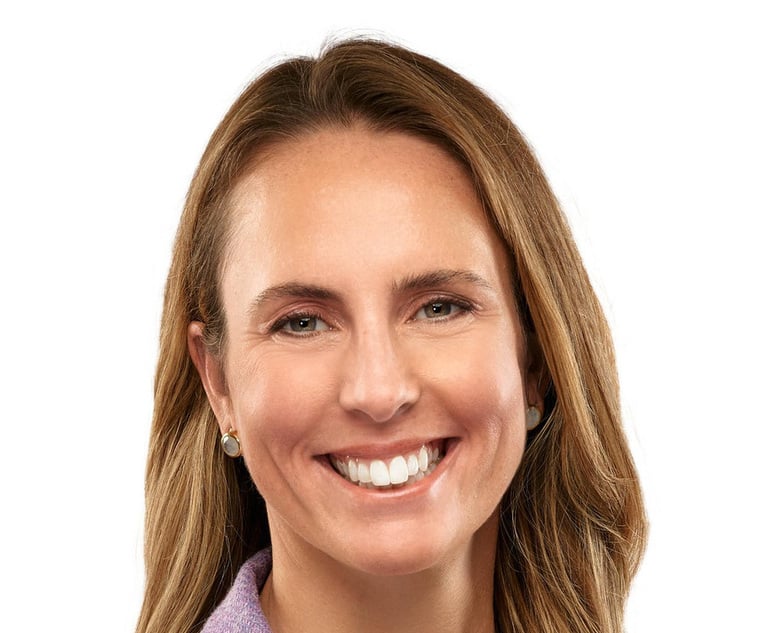'We've moved on' - BLP's Mayhew on what's next for the firm post-Greenberg
A month after merger talks with Greenberg came to an end, managing partner Lisa Mayhew remains upbeat about BLP's prospects
April 14, 2016 at 07:03 PM
5 minute read
"Nothing has changed for us," says Berwin Leighton Paisner (BLP) managing partner Lisa Mayhew as she sets out the firm's plans in the wake of the failed merger talks with US suitor Greenberg Traurig.
"We know what our strategy is and we're really clear about the sort of firm we are and want to be," she adds, speaking nearly a month after the most high-profile transatlantic merger discussions in years came to an abrupt end.
As far as Mayhew is concerned the demise of the talks, which according to BLP was a mutual decision but according to Greenberg sources was the US firm's call, will not stop BLP from talking to other firms in future, though a merger is by no means the focus.
"We've already shown that we can do a merger," she argues, referring to the 2001 tie-up between Berwin Leighton and Paisner & Co that created BLP. "BLP has in its DNA a recent experience bank of how to do a successful merger and we remain open to that, but our strategy is our strategy and isn't dependent on a merger.
"We're open to looking at any way to help accelerate our strategy, whether that's team hires, new offices, a series of mergers or a single merger. We have open minds to exploring the right way to deliver on our expectations."
If we want to become the world number one in real estate and infrastructure then we need to build a platform that makes us that in the leading markets in the world
These expectations are set out in the strategy drawn up since Mayhew took over the managing partner position from longstanding post-holder Neville Eisenberg last May.
They include international growth in litigation and corporate risk, and strengthening the corporate and finance practices, as well as infrastructure and real estate, where the firm hopes to become a world leader.
But the US remains an obvious challenge for BLP in the wake of the Greenberg discussions. The firm has internationalised more slowly than many of its UK rivals and does not have an on-the-ground presence across the Atlantic.
Former partners suggest BLP needs a merger to achieve its goals. As one ex-partner comments: "Everyone recognised that economies of scale were an issue for BLP; if they are pursuing a real estate-led strategy it is hard to think of a much better deal for BLP than Greenberg would have been."
Mayhew acknowledges the challenges of becoming a global real estate leader without a US presence but is keen to downplay the significance of the Greenberg talks or the need for a merger.
"Our strategy isn't a US-led strategy," she insists. "Of course, if we want to become the world number one in real estate and infrastructure then we need to build a platform that makes us that in the leading markets in the world but that may not mean a merger. It could be an alliance, a team or lateral hires and, in the shorter term, we have a preferred firm network [in the US] and are also part of the Advance Law network with Bird & Bird and Simmons & Simmons."
She hits back at rumours of discord within the partnership arguing that with associates and partners regularly briefed about the firm's plans, including its discussions with Greenberg at the time, there is a united front about plans for the future.
"If you talk to any current BLP partner or business services colleagues they'd tell you they know what our strategy is," she argues. "We've had a lot of regular meetings about our strategy as well as the potential merger and now we're uniting around a sense of purpose. We have an inclusive culture here and I'm keen for that to continue to flourish.
"There was a sense of unity before, during and following the discussions – but we've moved on from those talks. We're honestly all about us now – our people and our clients, which are undiminished by [those talks]."
How the firm goes about achieving the growth and standing it seeks without a merger – either domestic or international – remains to be seen but Mayhew is optimistic.
"We're prepared to look at bold and different things – the firm has spent the last 15 years travelling upwards and we want to keep travelling. Part of our strategy is that we want to be a game-changer firm and that means being willing to do things differently. Whether it's our LOD business or electing the firm's first female managing partner, we look at what's right for our clients and our firm and it doesn't faze us if that means doing new and different things."
The question is whether she will be able to convince both partners inside the firm and the market generally that she is right.
This content has been archived. It is available through our partners, LexisNexis® and Bloomberg Law.
To view this content, please continue to their sites.
Not a Lexis Subscriber?
Subscribe Now
Not a Bloomberg Law Subscriber?
Subscribe Now
NOT FOR REPRINT
© 2024 ALM Global, LLC, All Rights Reserved. Request academic re-use from www.copyright.com. All other uses, submit a request to [email protected]. For more information visit Asset & Logo Licensing.
You Might Like
View All
Pogust Goodhead Set to Axe Roles as Accounts Remain Overdue

DLA Piper Takes Greenberg Traurig’s Corporate Partner for Seoul

Cuatrecasas Elevates Seven to Partner in Spain and Latin America

McCarthy Tétrault Welcomes Former CPP Investments Leader to Its Business Law Group
2 minute readTrending Stories
- 1Friday Newspaper
- 2Judge Denies Sean Combs Third Bail Bid, Citing Community Safety
- 3Republican FTC Commissioner: 'The Time for Rulemaking by the Biden-Harris FTC Is Over'
- 4NY Appellate Panel Cites Student's Disciplinary History While Sending Negligence Claim Against School District to Trial
- 5A Meta DIG and Its Nvidia Implications
Who Got The Work
Michael G. Bongiorno, Andrew Scott Dulberg and Elizabeth E. Driscoll from Wilmer Cutler Pickering Hale and Dorr have stepped in to represent Symbotic Inc., an A.I.-enabled technology platform that focuses on increasing supply chain efficiency, and other defendants in a pending shareholder derivative lawsuit. The case, filed Oct. 2 in Massachusetts District Court by the Brown Law Firm on behalf of Stephen Austen, accuses certain officers and directors of misleading investors in regard to Symbotic's potential for margin growth by failing to disclose that the company was not equipped to timely deploy its systems or manage expenses through project delays. The case, assigned to U.S. District Judge Nathaniel M. Gorton, is 1:24-cv-12522, Austen v. Cohen et al.
Who Got The Work
Edmund Polubinski and Marie Killmond of Davis Polk & Wardwell have entered appearances for data platform software development company MongoDB and other defendants in a pending shareholder derivative lawsuit. The action, filed Oct. 7 in New York Southern District Court by the Brown Law Firm, accuses the company's directors and/or officers of falsely expressing confidence in the company’s restructuring of its sales incentive plan and downplaying the severity of decreases in its upfront commitments. The case is 1:24-cv-07594, Roy v. Ittycheria et al.
Who Got The Work
Amy O. Bruchs and Kurt F. Ellison of Michael Best & Friedrich have entered appearances for Epic Systems Corp. in a pending employment discrimination lawsuit. The suit was filed Sept. 7 in Wisconsin Western District Court by Levine Eisberner LLC and Siri & Glimstad on behalf of a project manager who claims that he was wrongfully terminated after applying for a religious exemption to the defendant's COVID-19 vaccine mandate. The case, assigned to U.S. Magistrate Judge Anita Marie Boor, is 3:24-cv-00630, Secker, Nathan v. Epic Systems Corporation.
Who Got The Work
David X. Sullivan, Thomas J. Finn and Gregory A. Hall from McCarter & English have entered appearances for Sunrun Installation Services in a pending civil rights lawsuit. The complaint was filed Sept. 4 in Connecticut District Court by attorney Robert M. Berke on behalf of former employee George Edward Steins, who was arrested and charged with employing an unregistered home improvement salesperson. The complaint alleges that had Sunrun informed the Connecticut Department of Consumer Protection that the plaintiff's employment had ended in 2017 and that he no longer held Sunrun's home improvement contractor license, he would not have been hit with charges, which were dismissed in May 2024. The case, assigned to U.S. District Judge Jeffrey A. Meyer, is 3:24-cv-01423, Steins v. Sunrun, Inc. et al.
Who Got The Work
Greenberg Traurig shareholder Joshua L. Raskin has entered an appearance for boohoo.com UK Ltd. in a pending patent infringement lawsuit. The suit, filed Sept. 3 in Texas Eastern District Court by Rozier Hardt McDonough on behalf of Alto Dynamics, asserts five patents related to an online shopping platform. The case, assigned to U.S. District Judge Rodney Gilstrap, is 2:24-cv-00719, Alto Dynamics, LLC v. boohoo.com UK Limited.
Featured Firms
Law Offices of Gary Martin Hays & Associates, P.C.
(470) 294-1674
Law Offices of Mark E. Salomone
(857) 444-6468
Smith & Hassler
(713) 739-1250









